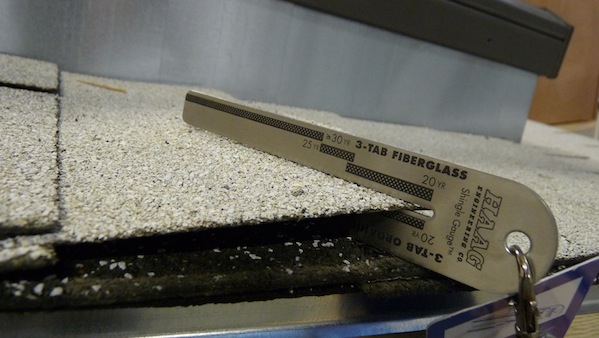Mastering Roof Inspections: Asphalt Composition Shingles, Part 10
by Kenton Shepard and Nick Gromicko, CMI®
The quality of asphalt shingles is generally reflected in the length of the warranty. You can get a good idea of the length of the warranty of strip shingles by checking the shingle thickness using a shingle gauge.

This device has a tapered slot lined with calibration marks that show the warranty connected with the shingle thickness. You won’t be able to positively identify the warranty of the roof, but using the gauge allows you to get a good estimate.

Here’s how you use it on a three-tab shingle.
When you use the gauge on a laminated shingle, you need to use it on a portion that’s only one layer thick. Shingle gauges are less accurate on laminated shingles.
This exceeds InterNACHI's Standards of Practice, but it’s fast and easy, and allows you to provide your client with valuable information at little cost to yourself.
If you provide this information, you have to be certain that your client understands that you are not certifying the roof or offering a warranty on the roof, or implying that it’s covered by a warranty. Make it clear that measuring the thickness of the shingle will identify the approximate length of the warranty, but does not accurately reflect the length of its expected service life.
Use a disclaimer in the inspection agreement and in the report, and tell the client verbally, or don’t use a shingle gauge at all. It’s good to educate your client, but you must also protect yourself. As an inspector and business owner, you’ll have to decide whether the marketing advantage is worth the potential liability.
**************************************************
Learn how to master a roof inspection from beginning to end by reading the entire InterNACHI series: Mastering Roof Inspections.
Take InterNACHI’s free, online Roofing Inspection Course
Mastering Roof Inspections
Roofing Underlayment Types
Inspecting Underlayment on Roofs
Fall-Arrest Systems
Roofing (consumer-targeted)
More inspection articles like this

